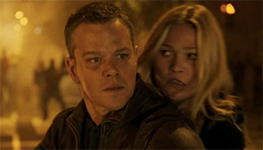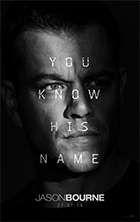Jason Bourne
|  The addition of Jason Bourne’s first name into the title of the newest film in the gritty espionage franchise—the fourth entry and the first in nine years—would seem to suggest that it is a more personal look at the conflicted former assassin. There is something humanizing about a first name, especially for an action hero (think of how many of them are referred to primarily by their last names), and the direct break with the manner in which the films have been titled—it follows The Bourne Identity (2002), The Bourne Supremacy (2004), and The Bourne Ultimatum (2007), the titles of which derived from the Robert Ludlum novels on which they were more and more loosely based—signals a shift in narrative focus in the same manner that Sylvester Stallone’s Rocky Balboa (2006) sought to bring its Philly pugilist back to earth after five increasingly cartoonish Rocky films. The addition of Jason Bourne’s first name into the title of the newest film in the gritty espionage franchise—the fourth entry and the first in nine years—would seem to suggest that it is a more personal look at the conflicted former assassin. There is something humanizing about a first name, especially for an action hero (think of how many of them are referred to primarily by their last names), and the direct break with the manner in which the films have been titled—it follows The Bourne Identity (2002), The Bourne Supremacy (2004), and The Bourne Ultimatum (2007), the titles of which derived from the Robert Ludlum novels on which they were more and more loosely based—signals a shift in narrative focus in the same manner that Sylvester Stallone’s Rocky Balboa (2006) sought to bring its Philly pugilist back to earth after five increasingly cartoonish Rocky films.Alas, that is not at all the case, as Jason Bourne is, in many ways, the least personal and introspective of the Bourne films. This does not, I should hastily add, make it a bad film. In fact, given the glut of increasingly routine and yawn-inducing CGI-overloaded destruction-fests that pass for summer entertainment these days, it is like a breath of fresh air (albeit fresh air laced with lots of bullets, flames, and smoke). However, despite the presence of returning director Paul Greengrass, who helmed three of the four previous entries in the series (Doug Liman directed the first one and has produced all the subsequent films), Jason Bourne feels somewhat out of step with the direction the series had been headed, perhaps because the final moments of The Bourne Ultimatum felt like such a satisfying coda. It may be there we are feeling the absence of screenwriter Tony Gilroy, who had a hand in writing all of the previous films, as well as the offshoot non-starter The Bourne Legacy (2012) starring Jeremy Renner, which he also directed. Gilroy is particularly good at infusing interpersonal dynamics into stories of global tension and violence; trust and deceit are threads that go through virtually all of his films as both writer and director, and while those elements are present in Jason Bourne, the fact that they lack some of the depth and punch present in the earlier films suggest that Gilroy’s absence is largely to blame (the screenplay is by Greengrass and Christopher Rouse, the latter of whom is a first-time screenwriter who has edited all of Greengrass’s films since The Bourne Supremacy). The story picks up nearly a decade after Bourne’s disappearance at the end of The Bourne Ultimatum, and we quickly learn that the former CIA assassin, who had been battling amnesia before learning of his dark past, is living a solitary life in rural Greece, where he earns money fighting in bare-knuckle brawls. He is dragged back into the world of international espionage when Nicky Parsons (Julia Stiles), his former handler and one of the few people in the agency who hasn’t been trying to kill or capture him, hacks into the CIA’s computer system and downloads their black ops file for Christian Dassault (Vinzenz Kiefer), the Julian Assange-esque leader of a group of cyber-activists who want to air the government’s dirty laundry. When Nicky discovers important information about Bourne in the files, she seeks him out, which makes it appear that he was somehow involved in the hack. Robert Dewey (Tommy Lee Jones), the CIA’s vicious new director, is intent on capturing or killing Bourne, as he still holds him responsible for exposing Blackbriar, the secret training program that turned Bourne into a programmed killer (it doesn’t help that the CIA is now ramping up Iron Hand, a new and more intense version of Blackbriar). He is aided by both Heather Lee (Alicia Vikander), the head of the CIA Cyber Ops Division who uses all of the digital technology at her disposal to track Bourne while slowly coming to the realization that he is not the enemy (she basically takes over the Joan Allen role from the previous two films), and another assassin known only as the Asset (Vincent Cassel), who wants to kill Bourne for very personal reasons. Mixed into all of that is another subplot involving Aaron Kalloor (Riz Ahmed), the young CEO and founder of Deep Dream, a Facebook-esque social media giant, who is under pressure from Dewey to share his customers’ data, thus yoking his company to government spying. As should be obvious, there are a lot of big, current-events issues threaded throughout Jason Bourne, particularly the insidious nature of digital technologies and communication and the increasing lack of privacy, much of which the ordinary citizen is completely unaware. The behind-the-scenes manipulation of social media for purposes of government surveillance is a queasy threat that most people want to pretend doesn’t exist, while the criminal activity of hacking for purposes of exposing illegal government operations strikes a similarly uneasy note—a necessary evil or a slippery slope into absolute chaos? Virtually everything that happens in the film has some kind of real-world corollary in the recent news cycle, which means that Jason Bourne is very much a product of its moment. However, all of that focus on the plot often comes at the expense of Bourne’s character, who sometimes seems like just another cog in the machine, rather than the focus of the narrative. Yes, we learn more about who he is—or, more precisely, who he was—and we even get some flashback scenes involving his father (Gregg Henry) and a young Bourne before he joined the CIA. Yet, it feels as though they are more in service to the espionage plotting, rather than the other way around (the previous Bourne films were complex narrative jigsaw puzzles, but Bourne and his identity crises always felt central). Again, none of this is to say that Jason Bourne is not a good movie, which it is. Greengrass again demonstrates a deft mastery of choreographing action sequences that are hectic but coherent (if anything, he has dialed back some of the unstable handheld camerawork and split-second cutting). Jason Bourne features a number of outstanding setpieces, including a lengthy sequence in Athens in which Bourne and Nicky are trying to escape various forces, including the Asset, amidst an increasingly violent anti-government demonstration (just to add a little more here-and-now background). Damon has aged well into the role, and his increasingly lined face leaves only residual traces of the boyishness we saw 14 years ago in The Bourne Identity. He wears the weight of his character’s experience in ways that are palpable (he looks hardened in a way that only time can produce), which gives the action dynamics increased dramatic weight without having to say a word. It’s just too bad that Greengrass couldn’t have found more ways to balance his character’s plight with all the ripped-from-the-headlines plotting, which makes for a sizzling good yarn, but one that lacks the interpersonal depths that made the previous entries in the series so mesmerizing. Copyright ©2016 James Kendrick Thoughts? E-mail James Kendrick All images copyright © Universal Pictures |
Overall Rating: 

 (3)
(3)


